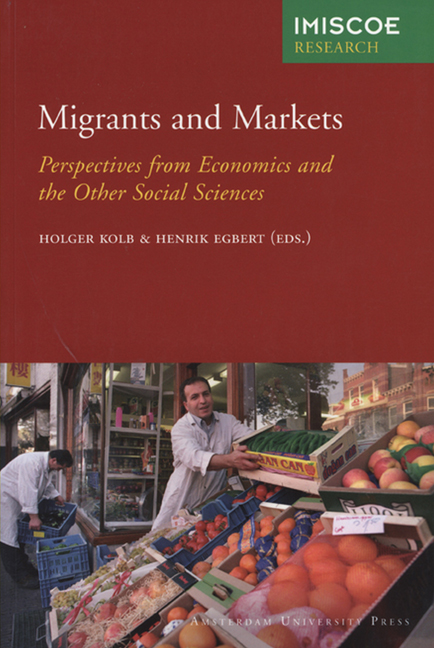Book contents
- Frontmatter
- Contents
- Introduction: Migrants and Markets: Perspectives from Economics and the Other Social Sciences
- The Impact of Immigration on the Labour Market: A Survey
- Investigating the Economic Impact of Immigration on the Host Country: The Case of Norway
- The Exit Option of Labour Migration from East to West Germany: Individual and Contextual Determinants of Unemployed Workers’ Geographic Mobility
- How Recent Amendments in German Immigration Law Affect Decisions: The Case of Polish Doctors
- Educational Selectivity and Labour Market Attainment of Jewish Immigrants from the Former Soviet Union in Israel and Germany in the 1990s
- States as Clubs? The Political Economy of State Membership
- Chinese Student Migration in Europe: A Migration That Nobody Objects To?
- Assessing Interdependencies between Sector Structures and Labour Migration: A Comparative Study of the British and the German Health Sectors
- Workers’ Remittances and International Risk Sharing
- Skills and Remittances: The Case of Afghan, Egyptian and Serbian Immigrants in Germany
- The Impact of Migration on Foreign Trade in Bolivia
- List of Contributors
- Other IMISCOE Titles
Skills and Remittances: The Case of Afghan, Egyptian and Serbian Immigrants in Germany
Published online by Cambridge University Press: 02 February 2021
- Frontmatter
- Contents
- Introduction: Migrants and Markets: Perspectives from Economics and the Other Social Sciences
- The Impact of Immigration on the Labour Market: A Survey
- Investigating the Economic Impact of Immigration on the Host Country: The Case of Norway
- The Exit Option of Labour Migration from East to West Germany: Individual and Contextual Determinants of Unemployed Workers’ Geographic Mobility
- How Recent Amendments in German Immigration Law Affect Decisions: The Case of Polish Doctors
- Educational Selectivity and Labour Market Attainment of Jewish Immigrants from the Former Soviet Union in Israel and Germany in the 1990s
- States as Clubs? The Political Economy of State Membership
- Chinese Student Migration in Europe: A Migration That Nobody Objects To?
- Assessing Interdependencies between Sector Structures and Labour Migration: A Comparative Study of the British and the German Health Sectors
- Workers’ Remittances and International Risk Sharing
- Skills and Remittances: The Case of Afghan, Egyptian and Serbian Immigrants in Germany
- The Impact of Migration on Foreign Trade in Bolivia
- List of Contributors
- Other IMISCOE Titles
Summary
Introduction
The issue of migration and development has become highly relevant in recent years on the global policy agenda. Countries and international organisations increasingly perceive migration as a phenomenon that can positively impact development in both migrant receiving and sending countries, provided that appropriate policies are in place. One of the central issues within the context of the migration and development nexus is the role of migrants’ remittances as a source of capital and possible engine for economic growth in developing countries.
Migrants’ remittances gained in importance on the international agenda because of the dramatic rise in international flows. Between 2001 and 2005 international migrant remittances’ flows increased by 58 per cent, to reach about US$ 232 billion (World Bank 2005a). With about US$ 167 billion, developing countries received the biggest share, while industrial countries in North America and Western Europe are the major sources. However, there is still limited knowledge about the way in which these international transfers affect economic development in the home countries of migrants.
Literature review
Empirical evidence illustrates that the amounts remitted depend on the migrants’ characteristics. Glytsos (1997) highlighted the importance of the immigrants’ return intention in determining remittance behaviour by proving that temporary migrants remit more than permanent ones. Semyonov and Gorodzeisky (2005) report gender differences in Philippine remittance behaviour, with male migrants sending more money than female migrants to households in the Philippines, owing to greater male earnings. DeVoretz and Vadean (2007) show that immigrant households belonging to ethnic groups in which people are more attached to their extended family remit more of their income and over longer periods of their lifetime. Faini (2006) points out that highly skilled migrants remit less than low-skilled because they are more likely to settle permanently and to reunite with their close family in the host country. Lucas (2001), however, argues that highly skilled migrants make a very important contribution to the development of their countries of origin, through remittances, investments and transfer of technology.
Nevertheless, the socio-economic environment and policies in migrant sending and receiving countries might also affect the amount remitted. For example, Vadean (2007) notes that migrants possessing dual citizenship (i.e. of the country of origin and of the host country) are more likely to be remitters and remit higher amounts compared to migrants of only one nationality.
- Type
- Chapter
- Information
- Migrants and MarketsPerspectives from Economics and the Other Social Sciences, pp. 203 - 223Publisher: Amsterdam University PressPrint publication year: 2008
- 1
- Cited by



